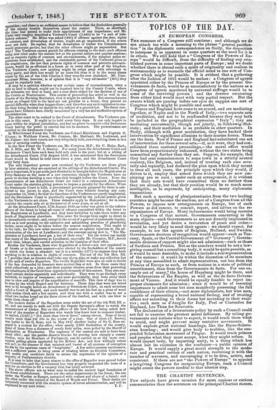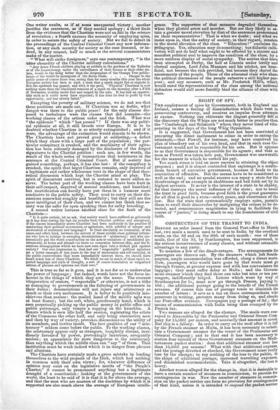THE CHARTIST SENTENCES.
FEW subjects have given occasion for more copious or curious commentaries than the sentences on the principal Chartist rioters. One writer exults, as if at some unexpected victory,' another justifies the sentences, as if they needed apology; a third finds from the evidence that the Chartists were not au fait in the science of revolution ; a fourth excuses the necessity of employing spies, in order to secure the safety of society. But we fail to detect in the proceedings of the Central Criminal Court any new informa- tion, or any such security for society as the case demand, or in- deed, in any respect, half so much as the several commentators make of the matter.
"What will strike foreigners," says one contemporary, "is the utter absurdity of the Chartist military calculations."
"Any dozen French children playing at soldiers in the gardens of the Tuileries or of the Luxembourg, under the surveillance of their bermes or their elder sis- ters, would do the thing better than the desperadoes of the Orange Tree public-
house or the would-be insurgents of the Seven Dials Danger to the public peace of course there was, seeing that for many months this year the whole European society has been in such a state that a spark might fire or explode it. But the epidemic has passed, and with it the peril. Physical' Chartism is now nothing more than the blackened remains of a squib on the morning after a Fifth of November, trodden under foot and sopped by the rain. It has had an opportu- nity such as it could never have expected; it has done its best to profit by that opportunity, and has utterly failed."
Excepting the poverty of military science, we do not see that these positions are made out. If Chartism was so feeble, what danger was there to the public peace? for the only classes dis- posed to turbulence were the classes that did conspire—the working classes of the artisan order and the Irish. What was "the epidemic" which "has passed " ? If there was any politi- cal epidemic at all, it still broods over Europe. It is to be doubted whether Chartism is so utterly extinguished ; and if it were, the advantage of the extinction would remain to be shown. The Chartists have not proved good at soldiering,—a defect which they share with a large part of the population ; the par- ticular conspiracy is crushed, and the machinery of their agita- tion has been seriously damaged by the disclosure of the forged signatures to the Chartist petition : such are, in few words, the result of the whole series of transactions that terminates in the sentence at the Central Criminal Court. But if society has gained something, perhaps, it has also lost : if the conspiracy is crushed, the spirit that begot Chartism remains, only deprived of a legitimate and rather wholesome vent in the shape of that theo- retical discussion which kept the Chartist mind at play. The spirit of discontent survives, but is restored to more sullen re- serve. The better part of the working classes have been hurt in their self-respect, deprived of mutual confidence, and humbled; but mortification can hardly have put them in a humour more conducive to the public safety. They used to carry on their dis- cussions somewhat roughly and boastfully ; but they still are the most intelligent of their class, and we cannot but think that so- ciety was the safer for open speaking than for sulky brooding.
A second writer lectures another class for the fault of the Chartists- " Is it quite certain, let us ask, that society would have suffered so grievously as it has done during the last six months from Chartist sedition and conspiracy, if the classes immediately above Chartists had been uniformly in the practice of conducting their political movements, or agitations, with sobriety of temper and moderation of sentiment and language? Is there absolutely no connexion, of the cause-and-effect kind, between the oratory of those middle-class political reform- ers who love to indulge in sweeping denunciations of aristocracy,' and who sys- tematically put the worst construction on the acts or omissions of established go- vernments, at home and abroad—is there no connexion between this, and the li- centious demagoguism which we have now seen ripen into a wicked plot against society? Our own impression is, that had our 'respectable' political agitators set a better example of late years in the way of moderation and self-restraint, in the public controversies that more immediately interest them, we should have heard much less of these Chartists. We think we see in much of these men's re- ported language and style of thought, a sort of coarse translation or vulgarized edition of phrases and opinions not their own."
This is true so far as it goes, and it is not for us to undervalue the power of language ; but indeed, words have not the force in- herent in the things of which they are the name. The coarsest 'vituperation of orators, "respectable" or otherwise, is not a tithe so damaging to governments as the faltering of governments in their duties : denunciations will not injure any aristocracy so much as their own uselessness. It is better to be positively mis- chievous than useless: the mailed hand of the middle ages was at least feared ; but the soft, white, gentlemanly hand, which is seen perpetually picking up the public money in public office and public patronage, only tempts a rapping on the knuckles. A Senate which is seen idle half the session, registering the edicts a the Commons the other half, and only being obstructive now and then by way of variety, provokes discussions on the utility of its members, and invites insult. The best qualities of our "aris- tocracy " seldom come before the public. To the working classes, the aristocracy appear only as strangers, haughtily distant, invi- diously favoured by power, provokingly luxurious, arrogantly useless ; an appearance far more dangerous to the aristocracy than anything which the middle class can " say " of them. That institution must be weak indeed which is in danger from phrases and allusions.
The Chartists have certainly made a gross mistake in lending themselves to the wild projects of the Irish, which had nothing m common with their own views for, whatever difference of opinion may exist on the legislative merits of "the People's Charter," it cannot be pronounced anything but a legitimate draught of a constitution : looking at the governments of the world, the least to be said of it is that it is far above the average, and that the men who are masters of the doctrines by which it is supported are also much above the average of European intelli- gence. The supporters of that measure degraded themselves when they plotted arson and murder. But are they likely to at- tain a greater moral elevation by dint of the sentences pronounced on their representatives That is what we doubt ; and what we insist upon is, that the safety of society, in their regard, consists in the moral elevation of the class. " Education 1" exclaims the pedagogue. Yes, education may do something; but didactic culti- vation will not do half what ought to be effected by a sincere and manifest political zeal to improve the condition of the class, by a more uniform display of social sympathy. The soirees that have been attempted at Derby, the ball at Lincoln under lordly and clerical auspices, Lord john Manners and his cricket, are bene- ficial, not because the rich provided, but because they shared the amusements of the people. Those of the educated class who share the political discussions of the people subserve a still higher pur- pose; and any measure, such as Mr. Frederick Hill's, which would enrol the representatives of the class among the national defenders would still more forcibly bind the alliance of class with class.



























 Previous page
Previous page